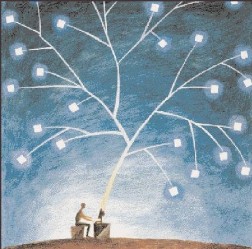
Adult Learning Theory
How does learning occur?
Adult learning occurs in a self-directed way and is problem-centered, rather than content-oriented (Lieb, 1991). In most cases, adult learning is an independent process in which learners take charge of learning material and concepts that are relevant to them. In adult learning, experience provides a basis for learning to occur (Conlan, et al., 2003). Much like social learning theory, learning occurs when individuals interact with their environment and use the tools of language, objects, and images to create meaning. The process of learning does not occur in a vacuum (Fenwick & Tennant, 2004). In adult learning theory, learning is a reflection of life experience.
What factors influence learning?
According to Fenwick and Tennant (2004), learning experiences are influenced by “the context of a person’s life—with its unique cultural, political, physical and social dynamics” (p. 55). Motivation is another factor in adult learning. In adult learning theory, learners are more likely to be intrinsically motivated. A learner’s motivation can determine how self-directed he or she chooses to be. Malcom Knowles, the father of androgogy (the art and science of helping adults learn), describes adult learners as those who:
What is the role of memory?
Much like social learning theory, memory in adult learning is thought of in terms of retention. In order to benefit from learning, individuals must be able to retain information. According to Lieb (1991), in order for learners to remember information, the information must be meaningful, and learners must be able to interpret and apply the information. In my opinion, practice and application seem to be the best ways for learners to retain knowledge.
How does transfer occur?
Transfer in adult learning will most likely occur when:
In other words, when the material is relevant, transfer takes place by connecting old knowledge to new. Then the information can be applied to current learning situations. In adult learning, past and current experiences are essential in the transfer of knowledge.
What types of learning are best explained by adult learning theory?
Practical and self-directed forms are learning are best explained by adult learning theory. Along with self-directed learning, other types of learning that suit adult learners are action learning, experiential learning, and project-based learning (Conlan, et al., 2003). For more details on the learning activities listed above, click on the following link to read the article by Conlan, et al. (2003): Article. Last, but not least, online learning has taken center-stage in adult learning due to its self-directed nature and convenience.
How is technology used for learning in the teaching field?
As an adult learner, I use multiple forms of technology to obtain information and share knowledge. Some of these technologies include: e-mail, online PLCs (professional learning communities), social networking sites, Google, Wikipedia, blogs, Walden library and virtual classroom resources, iPhone and iPad applications. Mobile access to the Internet is a great technological tool that can assist adult learners (Mathis, 2010). Web searches allow learners to use the Internet to instantly access an abundance of information. Other online sites/resources, such as e-learning platforms and social networking sites, allow learners to not only obtain information, but to share learning experiences in a social environment.